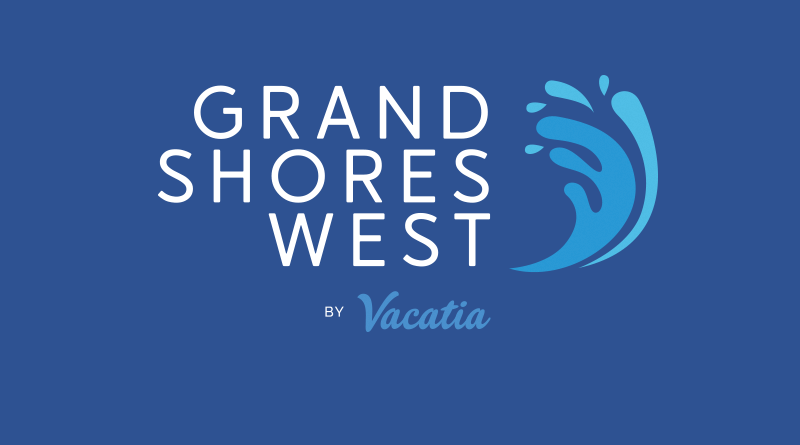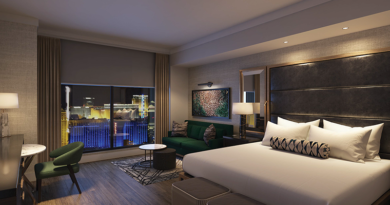Revitalizing Paradise: Halting the Resort Decline with a Remarkable Comeback
Too often the tales told about legacy resorts spread doom and gloom, lamenting that once a resort enters the dreaded death spiral of nonexistent sales and ever-increasing default rates, there’s not much that can be done. At times, the only remedy suggested is to sell off the assets and close up shop, leaving owners with no place to vacation and no value for their ownership.
Grand Shores West appeared to be headed in that unfortunate direction. Converted from a motel to a timeshare in the 1980s, the resort had a nearly 40-year run of consistent sales and stewardship by a single independent developer who invested countless hours and millions of dollars supporting the resort. He was also an owner who enjoyed the property with his family for decades.
In addition to having a developer who was determined to change the narrative about legacy resorts, Grand Shores West had a few other crucial factors working in its favor: an enviable beachfront location on Florida’s Gulf Coast and a dedicated core of dues-paying owners who treasured the resort.
But as he neared retirement a few years ago, the developer realized that continued financial support was no longer feasible. Possessing the foresight to get ahead of what the resort needed to stand on its own, he searched for a partner that had the expertise to renovate and drive increased rentals.
Enter Vacatia. The full-service management company — which specializes in revitalizing legacy resorts — customized a renovation solution that helped Grand Shores West build on past successes, regaining its vibrancy and even attracting new owners through its rental program.
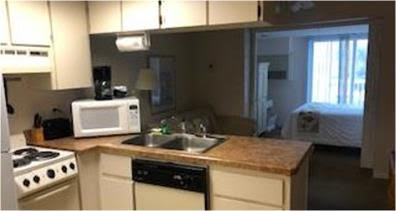
Challenge Accepted
In 2019, the resort had fully 25 percent of the units owned by the developer. Despite the location, the deferred maintenance had started to catch-up, and TripAdvisor reviews had become brutal: “Stay away — room and all furniture dated and nasty.” “Everything about this place is bad.”
What these comments didn’t mention was the resort’s beachfront location, a spacious pool, and proximity to 20 local restaurants and numerous attractions. Nearby resorts were renting for twice as much for standard rooms without kitchenettes. And in spite of everything, the remaining owners still loved their resort, with many staying for multiple weeks each year.
Seeing the potential for a turnaround, Vacatia purchased the management contract in early 2020. They developed an ambitious plan to restore the shine to this beachfront jewel. Of course, the crucial ingredient was cash.
With a budget of approximately $45,000 per unit and 80 keys, the total project ran to $3.6 million. Vacatia made the math work by loaning the HOA their portion of the money, which owners paid back via special assessment spread out over three years. “The key was being able to commit to doing the project all at once, while phasing in the construction during low owner usage periods,” explains Scott Weber, Vacatia’s senior vice president of hospitality. “It saved money overall and offered owners the ability to pay over multiple years, while continuing to vacation and ultimately enjoying a remodeled unit. It was a win across the board.”
Soon, the dust was flying as units were taken down to the studs. A fresh coastal look with lots of white, sand, and blue hues replaced the tired ‘80s earth tone; a reconfigured layout eliminated the bulky Murphy bed and moved the kitchenette along the wall, making the units appear much larger.
To expand its owner base, Vacatia bypassed traditional timeshare sales channels and simply ramped up the resort’s rental program, letting the renovation and location sell. The result: more rental revenue for the HOA and, ultimately, new owners.
Of course, with change came some resistance. That’s where Shaun Tulper, the resort manager who took the helm in June 2021, came in. “The owners were initially very skeptical and angry about all the changes that were happening and the special assessments,” Weber says. “Shaun has completely turned their attitudes around.”
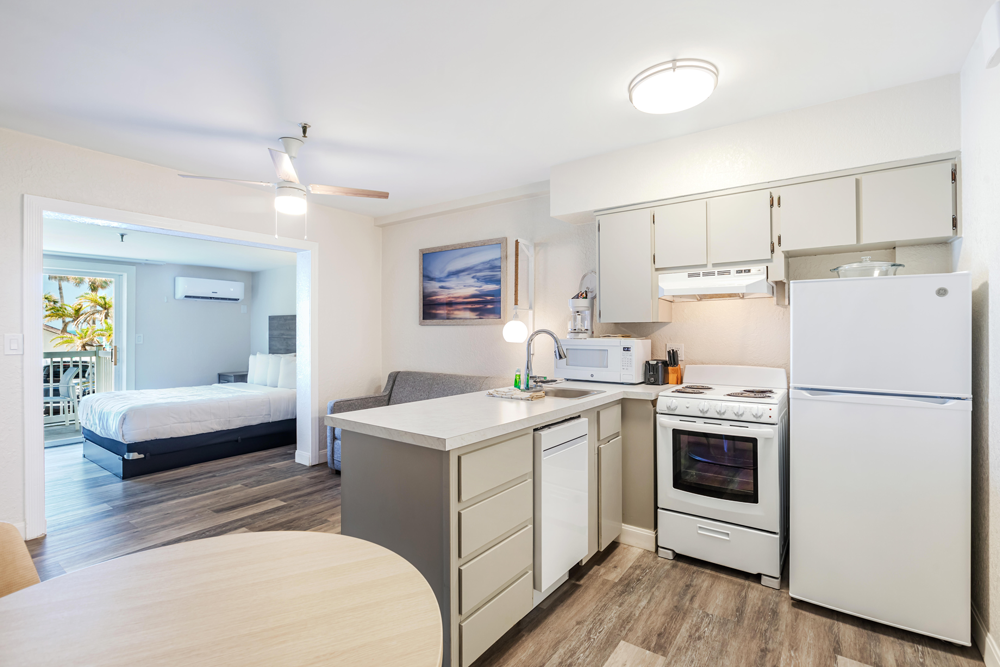
Tulper flooded owners with information about the resort’s finances, ongoing renovations, and how their money was being spent. He started a general manager’s email newsletter every other month, answering frequently asked questions. This communication is in addition to the usual owner communications regarding board elections, annual meetings, and maintenance fee billing. When owners are on property, his door is always open, and he’s often seen out at the pool or around the resort visiting with owners. The owners have their own Facebook page, and Tulper keeps it up to date, answering questions and posting information about and photos of the renovations. He also created subcommittees of board members to tackle important issues such as capital planning, as he believes that owner education is the key to better decision-making. “We worked diligently to put best practices in place and are on a new program now that has proven successful with owners,” Tulper says.
The boost in rental revenue has allowed the resort to increase its staffing, which benefits owners as well as renters. “Now, when guests arrive, there is always someone at the front desk to greet them,” Tulper says. “When there’s an issue at 10 p.m., there’s someone available to take care of it.” Additionally, new technology allows guests to communicate with the resort staff via text, again increasing satisfaction levels.
The resort offers nightly rentals, but has the ability to require a two- or three-night stay during high season and busy weekends. Because units turn over more frequently, housekeepers can work full-time, their salaries partly funded by the cleaning fees rental guests pay. Housekeepers began knocking on doors every couple of days to see if guests needed clean towels or their trash emptied. Even before the renovations were complete, the renewed emphasis on hospitality and unit cleanliness began to move the needle on reviews and rentals picked up steam.
In addition, increased rental revenue is helping to fund new amenities such as pool cabanas, kayaks, and paddleboards, enhancing the guest experience for both owners and renters.
Finally, the ability to rent inventory on behalf of owners who can’t use it that year has reduced the delinquency rate for maintenance fees, which keeps the HOA’s finances where they need to be. Occupancy levels remain 90% and up throughout the year.
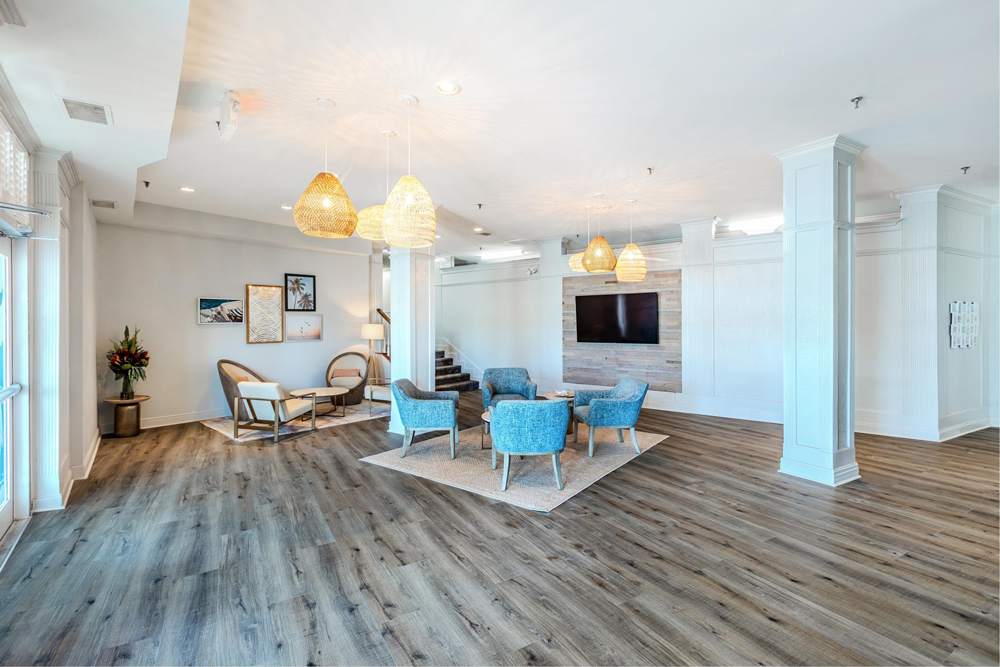
Results Are In
Now that the renovations are nearly complete, the resort’s future seems secure. Rental revenues for August, the last month available, topped $100,000, up from just $60,000 for the same month in 2022. But more importantly, owners are more invested in their resort.
“Just recently, a woman who had come the past two summers bought a unit,” Tulper says. “She had enjoyed her stays and was thrilled with the way the resort looked after renovation. I don’t think there is any way she would have become an owner without the renovations. This is happening again and again.”
Reviews, which began to creep up during the renovation, are now on solid territory. When Vacatia implemented its review service in 2021, the average review was 68%. In 2022, reviews rose to 77%; and year-to-date in 2023, they are averaging 83%, which means management and staff members can enjoy reading them. Here are a few excerpts: “We love the new updates in our room.” “The renovated units are beautiful.” “It is like heaven on Earth.”
Instead of the dreaded death spiral, Grand Shores West is now in a virtuous circle, with increased rentals funding improvements and services, which in turn attract more guests, ultimately creating new owners. That’s a legacy that any legacy resort can appreciate.
Judy Kenninger heads Kenninger Communications and has been covering the vacation real estate industry for nearly two decades.

